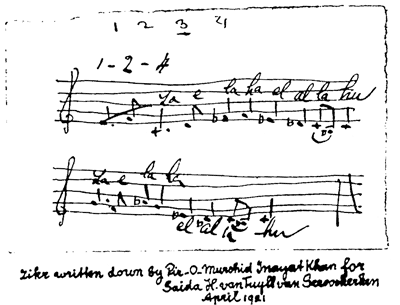The "Zikr Phrase" as used by Hazrat 'Ināyat Khān
In that memo, Saadi says: Hazrat Inayat Khan clearly insisted his mureeds use the pronunciation "El Allah Hu" for reasons of vibration, as you can see from the excerpt of the paper in the Sufi Movement archives that I have pasted below this article.
From the archives of the International Sufi Sufi
Movement
The Summer School transcript to which Saadi refers was not written by Pir-o-Murshid 'Ināyat Khān, but rather it was a transcription made by one of the students in the class, and suffers from at least two significant potential sources of pronunciation error in the phrase "La ella ha el Allah hu": 1) the use of the transliteration "el" is quite misleading since the pronunciation by Pir-o-Murshid was quite unlike the sound of the Spanish article "el" or the sound of "eel" which one might naturally be tempted to use, and 2) there is a syllable of the phrase entirely missing. We also have a similarly awkward transliteration from the archives of the Nekbakht Foundation in Sureness France. Here is a copy of the handwritten zikr, including musical notation, which Pir-o-Murshid gave to one of his students in 1921:
In the article which Saadi has referred to, Pir-o-Murshid 'Ināyat Khān is telling us that the sound of this phrase is very important, and if we intend to follow Pir-o-Murshid's guidance, we must learn to make the sounds properly, or at least close enough.... at task which is made much more difficult due to the unfortunate transliteration "el" and a missing syllable.
This appears to be a good example of a situation where unskillful transliteration is adding to the confusion rather than resolving it. Yes, it is certainly true that both Pir-o-Murshid 'Ināyat Khān and his students often used the letters "el" in their written transliteration. However it is also quite clear, to anyone familiar with the tradition of Islam, that the intended phrase is a well known Arabic phrase from the Qur'ān, which is often called tahlīl (meaning rejoicing or jubilation), and which is written in Arabic as:
This phrase would typically be transliterated according to contemporary USA standards as lā ilāha illā allāh. Note that due to rules of Arabic grammar, the long "a" at the end of "illā" merges with the initial "a" in "allāh" leading to a pronunciation of "lā ilāha illā-llāh". Also note that in that phrase, every letter is to be pronounced... so where the letter "l" appears twice, it is pronounced twice. The "hu" at the end of the phrase given in the Summer School class is, depending upon one's point of view, either an added "hū" (which is the Arabic pronoun "he") for the honorific value and mystical effect of its sound, or else it is a grammatical error. It seems likely that the "hū" was deliberately added, or is emphasized, for its honorific and mystical attributes, rather than its grammatical function.
Fortunately, to help set the record straight with regard to pronunciation, there is an audio recording of Pir-o-Murshid 'Ināyat Khān actually singing the words "lā ilāha illā allāh". He sings the words quite clearly, and quite conventionally. Please listen to this audio recording of Pir-o-Murshid 'Ināyat Khān (from the archives of the Sufi Movement) and you will hear for yourself... there is no "el" or "eel" sound as the Summer School transcript might lead us to believe, and the words are certainly not "La ella ha el Allah". In this recording, Pir-o-Murshid is clearly singing the words "lā ilāha illā-llāh". Pir-o-Murshid's students may have thought that he was saying something like "La ella ha el Allah hu", but due to their lack of knowledge of that "foreign" phrase, they chose some misleading transliteration characters and erroneously left out a syllable, thereby leaving us with a very misleading transliteration. In the body of Saadi's letter, it appears (to me) that there is great emphasis on the word "el" (perhaps as an allusion to Murshid Sam's controversial "la ilaha el il allahu"), when in fact I believe that Pir-o-Murshid was simply attempting to convey the fact that there can be great power in chanting the tahlīl with added emphasis on the first syllable of "illā". And, in fact, chanting in that manner is apparently quite common in a number of Sufi orders which I've enjoyed zikr with, with their chant emphasis often falling first on the initial "lā" and then on the "il" of "illā" in the phrase "lā ilāha illā-llāh" (where the bold letters denote the emphasized syllables). Unfortunately, by simply quoting the fragment "El Allah Hu", as Saadi has done in the body of that letter, he fails to provide a meaningful context for the fragment and also fails to provide any suitable guidance for either usage or pronunciation. Thereby potentially misleading the casual reader.
To better understand the situation, it is important to note that these words of Pir-o-Murshid 'Ināyat Khān, as given in his lectures, were transcribed by his students and/or his secretary, the majority of whom were not native English-speakers, and who had little or no familiarity with the "foreign" words that he used. In fact the transliterations in both the transcripts and the Sufi Message texts were often so full of errors that the original phrase was rendered virtually unrecognizable. Fortunately Dr. M.C. Monna provided a great service to all Ināyati students when she created the "Short Dictionary of the Foreign Words in Hazrat Ināyat Khān's Teachings". By the second revision of her dictionary in 1991, she had identified and corrected hundreds of errors in the "foreign" words which had originally appeared in the lecture transcripts and Sufi Message texts. The "foreign" words and phrases found in the lecture transcripts and Sufi Message texts should not be trusted to be correct. As Dr. Monna wrote in the introduction of the dictionary: Though Hazrat 'Ināyat Khān spoke slowly, it cannot have been a light task to take his words down. His pronunciation showed the characteristics of Indian speakers, not always easy to understand by people in the West, to many of whom even ordinary English was a foreign language. Besides this, Murshid was apt to use foreign, Eastern, words, which were unknown to most mureeds. People did their best to write down what they thought they heard, but the results were often bewildering. There seems to have been no opportunity in Murshid's busy days for the mureeds to go and ask afterwards about the spelling of a foreign word. As far as one can see the mureeds had not agreed on a special system for the spelling of foreign words. Everybody did their very best, but nobody in the international gathering knew exactly what another meant by a certain transcription. The English, thinking of the word 'but' were apt to write -u- for an Indian -a-, e.g. 'durgah' for Indian 'dargāh' (door, royal court, palace, shrine, tomb of a saint as a place of pilgrimage). Others saw in this -u- a full, long -ū - (as -oo- in 'moon') and pronounced 'dūrga:', which is quite a different word, the name of a Hindoo goddess. Another writer, perhaps Dutch, thought he heard a slight vowel between the -t- and the -m- of 'khatm', as would be usual in his native language, and so wrote 'khatum'. Others again took this -u- for a long - ū - (-oo-) and pronounced 'khatūm', thus making two syllables where there was only one, and putting the stress on a vowel that did not even exist in the original word. This sort of thing not only caused quite unsatisfactory spellings to occur in the publications (e.g. naminaust for hamin ost), but also influenced people's pronunciation and thus altered the vibration of the word. Hazrat 'Ināyat Khān again and again stressed the fact that the value of words depends on their vibrations. Short Dictionary of the Foreign Words in Hazrat Ināyat Khān's Teachings, Dr. M.C. Monna
In order to fully grasp the intended teaching of Pir-o-Murshid 'Ināyat Khān in the Summer School 1925 transcript, in may be useful to have the following at hand: 1) The intended phrase recorded in the native language: لا اله الا الله lā ilāha illā allāh لا lā No, not, by no means; there is not. اله ilāha A god; that which is worshipped. الا illā If not, otherwise, besides, except. الله allāh God, the Supreme Being, the One.
2) A sound recording of the phrase (without the final "hū"): ( pronounced as lā ilāha illā-llāh ) audio recording of Pir-o-Murshid 'Ināyat Khān
updated 23-Feb-2015
|



